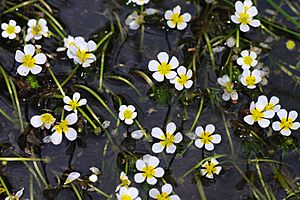Threadleaf crowfoot facts for kids
Quick facts for kids Threadleaf crowfoot |
|
|---|---|
 |
|
| Conservation status | |
| Scientific classification |
|
| Kingdom: | Plantae |
| Clade: | Tracheophytes |
| Clade: | Angiosperms |
| Clade: | Eudicots |
| Order: | Ranunculales |
| Family: | Ranunculaceae |
| Genus: | Ranunculus |
| Species: |
R. trichophyllus
|
| Binomial name | |
| Ranunculus trichophyllus Chaix ex Vill.
|
|
| Script error: The function "autoWithCaption" does not exist. | |
| Synonyms | |
|
|
Script error: No such module "Check for conflicting parameters".
Ranunculus trichophyllus, also known as the threadleaf crowfoot or thread-leaved water-crowfoot, is a type of plant. It belongs to the Ranunculus family. You can find this plant naturally growing in Europe, Asia, and North America.
It's a plant that can live for just one year (an annual) or for many years (a perennial). It usually grows in water, like slow-moving streams, ponds, or lakes. Its flowers look a bit like daisies. They are white with a yellow center and have five petals.
This plant is similar to another water-crowfoot called Ranunculus fluitans. However, the threadleaf crowfoot has five petals and shorter leaves. It also prefers water that moves more slowly. Its seeds grow in round heads that become fruits covered with tiny bristles. Scientists have studied how its special segmented leaves help it to photosynthesis underwater.
Contents
About the Threadleaf Crowfoot
The threadleaf crowfoot was first described by a French scientist named Dominique Villars. He wrote about it in his book 'Histoire des plantes du Dauphiné' in 1786.
The second part of its scientific name, trichophyllus, comes from Latin. It means 'hairy leaves', even though the leaves are not actually hairy.
In America, people sometimes call it the 'white water crow foot'. In Iceland, its name is Lónasóley.
Where the Threadleaf Crowfoot Lives
This plant grows in many places across the Northern Hemisphere. You can find it in the United States, Europe, and around the Mediterranean Sea. It also grows east through Siberia, the Caucasus mountains, the Middle East, and the Himalayas. It's found in Kazakhstan, Mongolia, and even as far as Kamchatka in Russia. You can also spot it in Japan, China, and Korea.
It's amazing, but this plant even grows in the lakes and ponds near the top of Mount Everest!
Its Home and How It Grows
The threadleaf crowfoot loves freshwater. It can be found in many wet places. This includes wet areas between sand dunes, drainage ditches, ponds, and lakes. It also grows in streams and rivers where the water moves slowly.
This plant can grow at high altitudes. It is often found around 3,000 meters (about 9,800 feet) above sea level.
See also
 In Spanish: Ranunculus trichophyllus para niños
In Spanish: Ranunculus trichophyllus para niños


